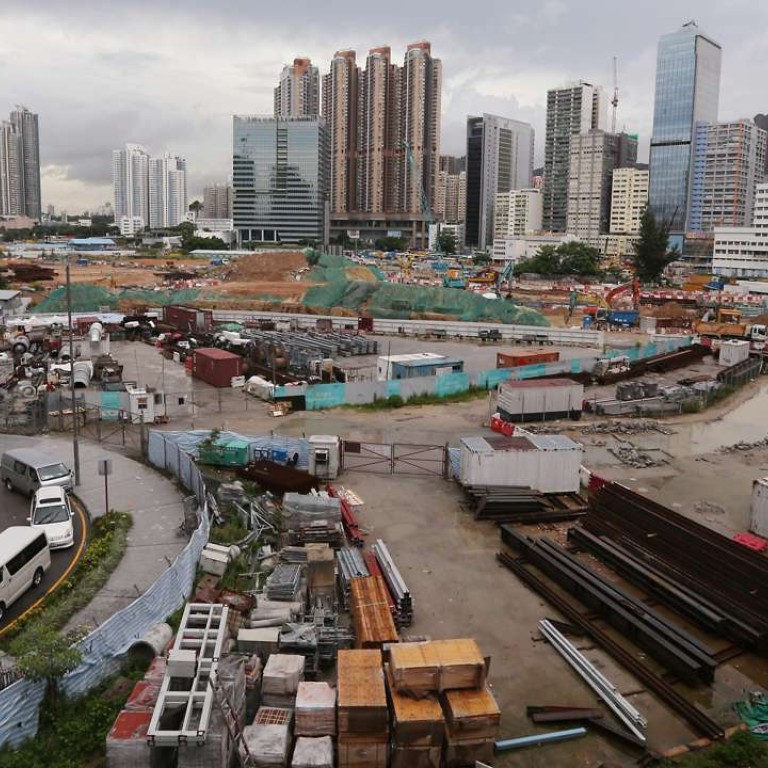
Hong Kong sticks to land sale targets, with supply for about 9,500 units on track in six-months to September
The government remains on track to release new land supply onto the market, even as the real estate correction looks set to deepen in the second-half of the year, buffeted by global markets that have yet to discount the Brexit factor.
Wednesday the government offered seven residential sites and two commercial sites with an estimated value of up to HK$22.8 billion for tender over the next three months.
The seven residential sites in Yuen Long, Tuen Mun, Sha Tin, Beacon Hill, Kai Tak area and Kwun Tong will support the construction of 4,760 units.
Together with another 80 flats to be provided by the Urban Renewal Authority (URA) in Shum Shui Po, and combined with 4,740 units coming from other lots sold in March to June, the number will reach 9,580 in the six months to September.
“Land providing for new flats in the first two quarters of the 2016-17 financial year will be 6.5 per cent higher than the original target of 9,000. The government aims to provide land for building 18,000 flats for the full year ended March, 2017,” said development minister Paul Chan Mo-po on Wednesday.
Commenting on the Brexit impact on the Hong Kong property market, he said there are various external factors such as interest rates, and the economy in the US, Europe and China which could affect the local real estate market. At home, he said the market could also be affected by a downturn in Hong Kong’s economic performance and employment rate.
“The government will closely monitor the market situation and spare no effort in identifying other sites suitable for development. Our objective is to ensure a steady, sustained land supply to the market to cater for the community’s land demand for private housing and other uses,” Chan said.
Thomas Lam, head of valuation and consultancy at Knight Frank expects to see rising uncertainties in the second half of this year. He added that the number of transactions in the residential market could plunge to less than 50,000.
“It will be the lowest in the past two decades,” he said.
Buggle Lau, chief analyst at Midland Realty said the government’s move to increase land supply would likely stabilise home prices amid a vibrant property market.
“But in a reverse market trend, demand and supply will further widen if the government failed to adjust its land sale programme,” he said.
For the six months to June 28 there were 5,382 new homes sold, according to Midland Realty, about 40 per cent fewer than the 9,580 flats to be provided by government land sale in the first half of the fiscal year ending March 31, 2017.
Since March 2013, the government had provided enough land to build 50,000 private flats, but buyers snapped up only 39,000 apartments during the same period, according to Midland Realty. Home prices have fallen about 10 per cent from the September peak last year.
Dorothy Chow, regional director of the valuation department at JLL, said: “Constrained by the weakening local economy, and the uncertainty in capital flows brought by the vote for Brexit, developers are expected to adopt a wait-and-see attitude towards land acquisition in the next few months. Their offers for sites in areas with more new housing supply would be more conservative.”
Among the nine government sites, surveyors expect the commercial site at Kai Tai area, which could yield a total gross floor area of 1.09 million square feet, would generate a bid of HK$6.5 billion, or HK$6,000 per square foot.
Marcos Chan, head of research, CBRE Hong Kong, Southern China and Taiwan said the industry has been pressuring the government to expedite the launch of commercial sites in view of the continued low vacancy rates across all commercial real estate sectors in Hong Kong.
“The short term market volatility will not affect the attractiveness of the site. We expect large developers in Hong Kong will be interested in bidding for the site,” he said.
Thomas Lam's name was corrected in the 8th paragraph

